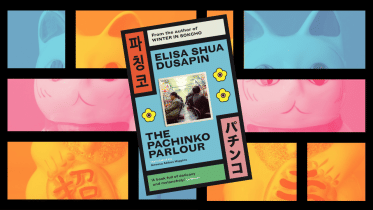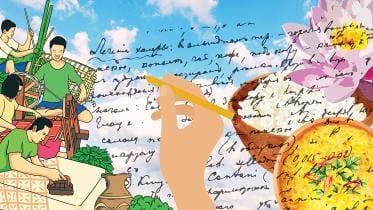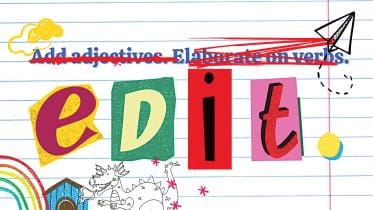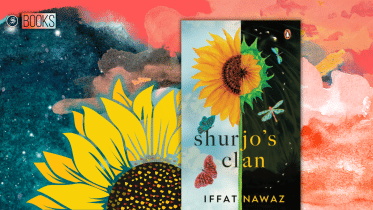The heart will lead you back
Originally from Massachusetts, international development consultant Elizabeth Shick was living with her family in Yangon, Myanmar from 2013-2019 and got to witness not just Aung San Suu Kyi’s National League for Democracy win the 2015 elections by a landslide, but the military crackdown on Rakhine state that led to the Rohingya exodus into Bangladesh in 2017.
31 January 2024, 18:00 PM
Learning to let go
As the novel progresses, you peel back layers of history between Claire and her grandparents and realise that the Korea issue isn’t as straightforward as our protagonist imagined.
28 December 2023, 12:23 PM
What you call your own
As an Anglophone writer in Bangladesh, I’ve frequently faced the rather inane question of why I write in English.
27 September 2023, 18:00 PM
Mood mirror
Whenever depression is depicted in pop culture, it is shown in some visible extreme, with blue-grey lighting, dark rooms, ashen faces peering out through rainy windows, bodies curled up in bed.
30 August 2023, 18:00 PM
Why so serious?
Falling into the comfortable rhythm of a familiar form, it took scant minutes to bang out a silly poem that made me laugh and melted away all the tension, and it took me back to why I created Sehri Tales in the first place.
15 April 2023, 10:55 AM
The magic of muscle memory
While talent might determine the quality of the writing, and many of our Talers have these in buckets, the basic skill is actually a result of something more mundane: consistent practice.
7 April 2023, 18:00 PM
Homegrown heroine
This story, which originally began as a short story, features a headstrong heroine putting her desires above what society expects of her, in order to realise her destiny.
5 April 2023, 19:22 PM
In defense of brevity
You’ve got a fantastic project, and have found a potential investor for this. They’ve given you two minutes to deliver a killer pitch and convince them you’re worth it.
31 March 2023, 18:00 PM
Take note: How note-taking can come in handy when you’re short of inspiration
Watch this print space for the Talespeople's weekly reflections on creative writing.
24 March 2023, 18:00 PM
Family of feelings: Iffat Nawaz's 'Shurjo's Clan'
Part memoir, part magical realism, this is a story about identity and the idea of home.
26 January 2023, 10:20 AM
Jane Borges’ 'Bombay Balchão' is a crafty explosion of flavour
The characters crackle with life, quirky and contradictory, despicable and sympathetic in turns.
1 December 2022, 04:00 AM
Ink for days: How Inktober is its own medium of storytelling
Pictures are really the most basic form of story-telling, aren’t they? I imagine our ancestors sat around fires doing shadow theatre. They painted on cave walls long before writing came along.
28 October 2022, 04:00 AM
The Sehri Tales prompt is a Rorschach test for participants
If there is one thing that worries me a little, it is that the strong trend for themes of sexual violence that began to appear during lockdown, continues to be favoured by a significant number of our domestic writers.
2 May 2022, 10:11 AM
It gets better
It’s hard to believe, but we only moved out of the sandbox provided by Litmosphere (thanks Rubaiya and Ramisa Chowdhury) two years ago, and shifted Sehri Tales © to an independent platform in 2020! We hope you’ve been enjoying the stories so far.
25 April 2022, 18:00 PM
Ramadan Maghfirat: How I channelled my rage into inspiration for Sehri Tales
I channelled my hurt, anger and frustration into poetry and flash fiction that had nothing to do with my agitator and her cronies.
21 April 2022, 10:20 AM
This is how we do it
This year, most of the frequently asked questions pertain to the selection process behind the stories chosen for our Star Youth collaboration. I hope the following explainer answers most of them.
18 April 2022, 18:00 PM
Not quite what we were expecting
We promised to go big for our fifth year, but we haven't even begun to unveil our big plans, before being overwhelmed by the sheer response from our participants.
12 April 2022, 11:16 AM
Finding ‘Rahmah’ during Ramadan, against the odds
Life in Dhaka provides a thousand reasons to feel hopeless and frustrated. Still, we can find hope amongst it all.
10 April 2022, 14:07 PM
Once more, with feeling
Last year, we got to see some stellar writing and some incredible art. What was more inspiring than the quality of work produced during the holy month, was the community that was formed in the process.
4 April 2022, 18:00 PM
Take a bow
With the moon up and celebrations already underway in a few countries, it’s a wrap for Sehri Tales 2021.
13 May 2021, 13:21 PM





























